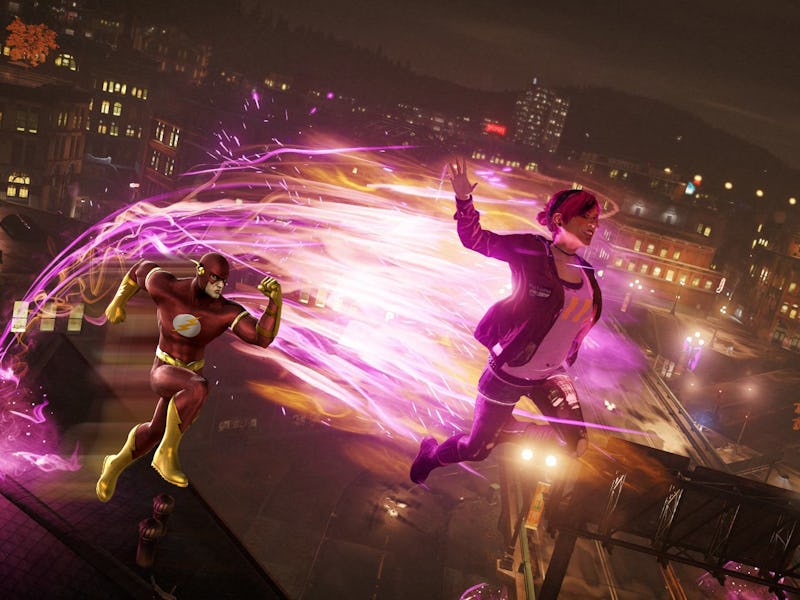'Infamous' Already Knows How to Make a 'Flash' Video Game Work
In 'Infamous,' Conduits might as well be called meta-humans anyway.

The Flash runs really, really fast. Sounds simple enough, but his superspeed has left video game developers in the dust when it comes to designing a video game involving the Scarlet Speedster.
When video game publisher Brash and game studio BottleRocket tried to make The Flash: The Fastest Man Alive back in 2009, the game’s ambitions were greater than the technology available at the time. “Flash would run so fast he could get to a section of the city that hadn’t even loaded yet,” BottleRocket Lead Designer Greg Miller told Inverse earlier this year. The hardware just couldn’t keep up, but 2017 might be a different story.
There’s one gaming franchise that might have accidentally found a solution by, surprisingly, slowing way, way down.
The Infamous franchise, which was developed by Sucker Punch and published by Sony, nailed what could be the answer to the Flash’s greatest problem since getting stuck in the Speed Force: “Neon powers.”
In the world of Infamous, the “Conduit gene” is a naturally occurring mutation in some humans that sometimes triggers the development of supernatural abilities, usually pertaining to the manipulation of energy, or matter, or other alterations to physical or mental abilities. It’s remarkably similar to the mutant gene that famously gave rise to mutants like the X-Men in the Marvel universe.
Though the protagonist of the first two Infamous games primarily controlled electricity, another variant of Conduit powers, explored in more recent games — most notably Infamous First Light — is called Neon. These types of Conduits can absorb and utilize light in various ways, but the most direct manifestation of Neon powers allow some Conduits to do everything super-fast, from punching to running up walls, making enemies move in slow motion by comparison. Sounds a lot like the Flash already, doesn’t it?
The most obvious Speedster-esque Neon power is the aptly-named Light Speed.
The name makes it obvious, but Light Speed users move incredibly fast and can even scale buildings and make long jumps with ease. They can also surge their powers for short bursts of speed. Functionally, Neon users spend much of their time outmaneuvering enemies with their speed and rushing with ease between distant objectives, running along walls and across water, and leaping from roof to roof. Functionally, that also describes the plot of every episode of The Flash ever.
Delsin Rowe demonstrates Neon powers in 'InFamous Second Son.'
In Infamous, Neon powers also include a wide variety of photokinesis, allowing users to shoot beams of lights like laser weapons, levitate — almost like Iron Man — with Neon Thrusters, use various forms of Neon shielding, and even deploy a Neon Singularity to really demolish their surroundings. These projectile abilities would synergize really well with the Flash’s infrequently used ability to throw lightning. After all, Conduits have been throwing light around since the very first Infamous game in 2009.
Barry can also create wind vortices by spinning his arms ultra-fast or even start (or stop) a tornado by running in a tight circle for long enough. He’s also been known to phase right through walls and other objects.
These effects might require a bit more ingenuity, as they don’t have direct precedents in Infamous, but in a game franchise that has Neon-fueled black holes, anything is possible, right?
Another core aspect of Neon combat in the Infamous games is light-fueled, super-fast punches and kicks that are virtually identical to the Flash’s Lightning Punches. Take one look at some standard Neon hand-to-hand combat, and it’s easy to imagine that a Neon Conduit — like Abigail Walker in Infamous First Light — could easily be mistaken for a speedster in the DC Comics universe:
With Neon skills, players have to first absorb light as fuel and then use it sparingly as they go about their business fighting enemies and completing missions in an open world environment. Unless players unlock the necessary abilities, they can only use Light Speed running for short periods of time.
In a game about the Flash, the clearest and most obvious first step is simple: no need to absorb light and no limit to the amount of running, and it would already be well on its way to becoming a Flash game.
From a design standpoint, it would only take a few subtle tweaks to turn this:
Neon Light Speed on display.
… into something closer to this:
The lightning trailing behind Barry Allen's Flash when he runs is yellow.
Shifting all the pink to bright yellow and tossing a red costume on the player’s character would instantly create the famed Scarlet Speedster. (For what it’s worth, customizable lightning colors and a speedster costume design mechanic would really whet fans’ appetites.)
In 2017, with The CW’s The Flash still immensely popular and a new film version of the Flash included in the upcoming Justice League, there’s no better time to have the Flash dash right into his own solo adventure in a video game.
And if ever there was a game studio that could make a game about The Flash work, it’s apparently Sucker Punch.